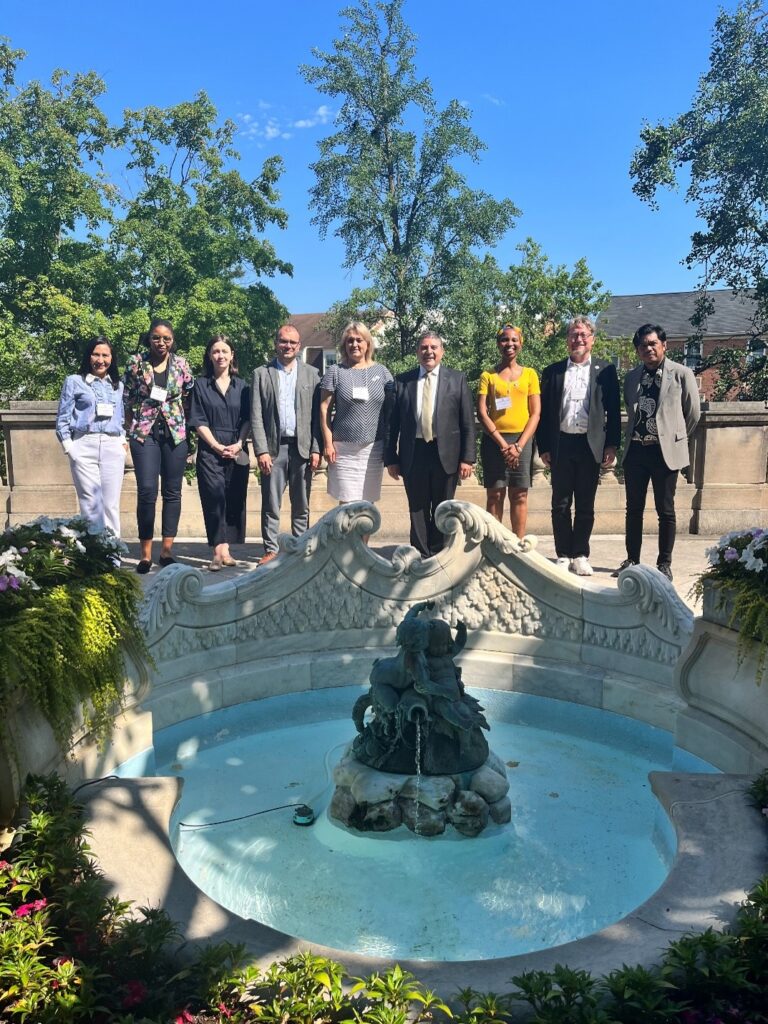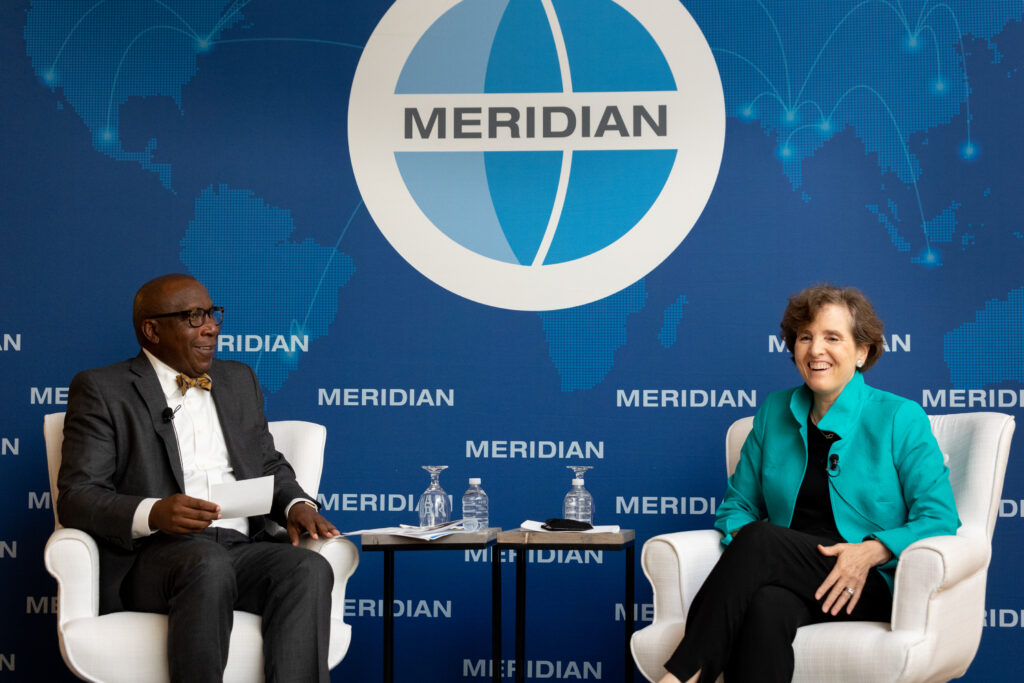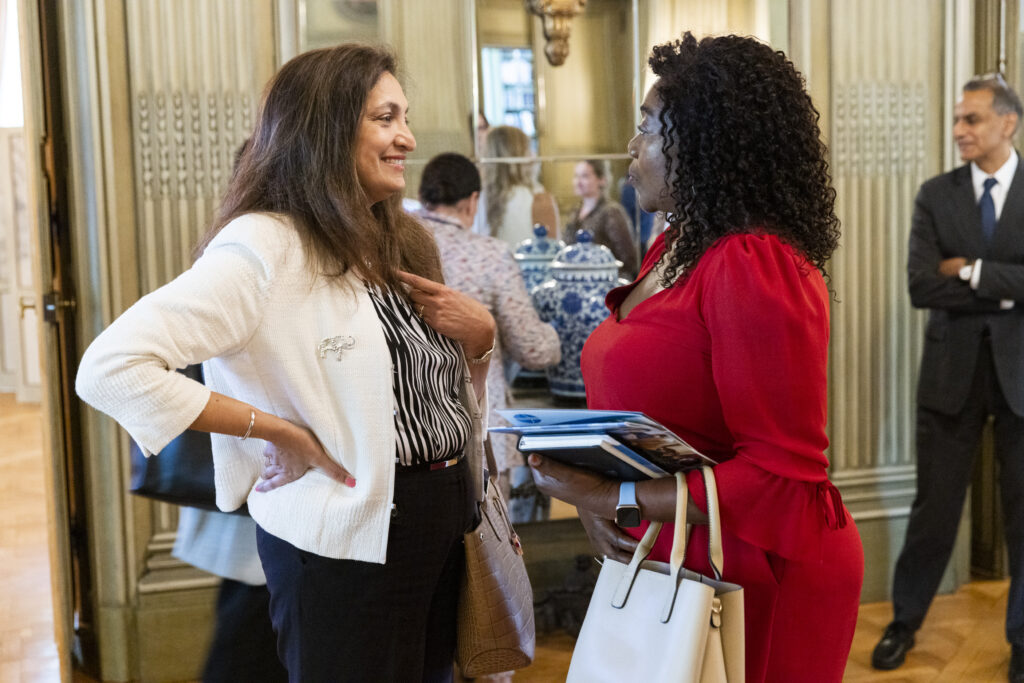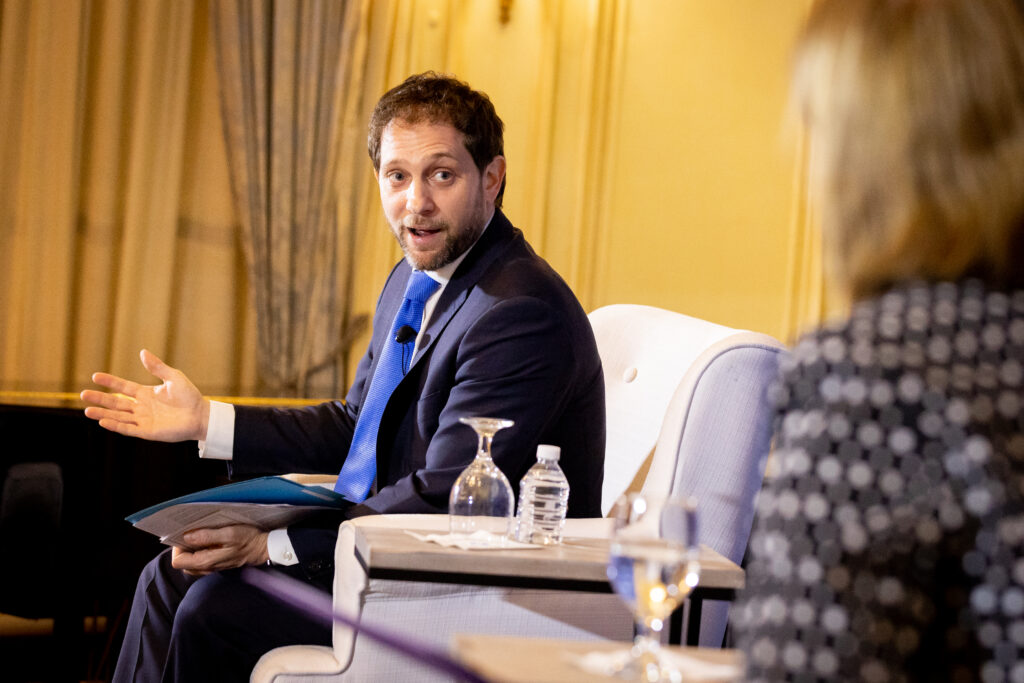This post was written by Ryan C. Scherba, Associate Program Officer at Meridian’s Center for Diplomatic Engagement.
The inaugural Summit for Democracy in December 2021 brought together over 100 nations which made over 740 commitments to strengthen democracy in three main areas: defending against authoritarianism, addressing and fighting corruption, and advancing respect for human rights. Hosted by the United States, these nations made commitments to ramp up efforts to support democracy against authoritarian and non-democratic regimes that threaten peace and security regionally and globally.
Meridian is an ardent proponent of democracy. It is core to us as an institution. As CEO Ambassador Stuart Holliday penned in a blog post ahead of the Summit for Democracy, “At Meridian, we have long advocated supporting government efforts with communities of interests drawn from civil society, the private sector and journalists to advance the cause of democratic engagement and accountability.”
MODERN-DAY THREATS TO DEMOCRACY
Russia has been accused of human rights abuses since it invaded Ukraine in February under the authoritarian leadership of Vladimir Putin. The UN Human Rights High Commissioner noted in April that there were over 50 civilian killings in the Bucha Massacre and there has been nearly 5,000 civilian deaths to date in 2022. Russia blocked key ports in Ukraine that export wheat, barley, and sunflower oil which feeds 400 million people worldwide including nearly 40% of Africa’s wheat supply until a deal was reached in July. Less than 24 hours after signing the deal, Moscow again bombed the port of Odessa which was preparing to ship grain worldwide. Rising fuel prices cause concern for the U.S. and Europe as Russia state-owned Gazprom shut down the Nord Stream 1 (NS1) pipeline indefinitely. Putin may exacerbate the situation by permanently shutting off the pipeline to Europe. Under Vladimir Putin’s Russia, the world is beholden to his autocratic measures that negatively affect nations and their economies.
General Secretary of the Chinese Communist Party and Chairman of the Central Military Commission Xi Jinping is undermining democracy in Asia and employing economic warfare against democracies. China’s persecution of Uyghurs, subjugation of Tibet, eroding of freedom and democracy in Hong Kong, and military threats against neighbors have led to the U.S. denouncing China’s actions in Asia. China announced four days of live ammunition military exercises surrounding the island of Taiwan after Speaker of the House Nancy Pelosi led a congressional delegation to the Indo-Pacific, including a stop in Taipei. China is enticing democracies to align with them by providing loans primarily for infrastructure projects. Beijing has tripled its loans for low and middle-income countries in the past decade, reaching $170 billion. The U.S. and G7 partners aim to combat China’s debt-trap diplomacy for infrastructure projects through Build Back Better World and provide foreign assistance reaching hundreds of millions of dollars for countries that meet the required criteria on democratic political standards. Even as Russia’s war of choice rages on in Ukraine, Secretary of State Antony Blinken, on May 26, noted that China remains the “most serious, long-term challenge” under Chinese Communist Party rule.
NON-DEMOCRATIC REGIMES STICK TOGETHER
Venezuelans protested against Nicolás Maduro’s second presidential inauguration, which drove Venezuela into an economic and migrant crisis from January to November 2019. According to Freedom House, the Maduro regime relies on “economic, medical, military, and other assistance from foreign allies to maintain power, particularly from Russia, Cuba, Turkey, and Iran.” To date, China has also lent $60 billion to Venezuela. Venezuela’s economic collapse following demonstrations led to a humanitarian crisis. Over 4.6 million migrants fled Venezuela and 3.8 million settled in Latin America and the Caribbean. On July 11, the U.S. announced the extension of Temporary Protected Status for Venezuelans in the United States. In September 2021, the U.S. provided $247 million in humanitarian assistance and $89 million in economic and development assistance for Venezuelans in their home country and for refugees, migrants, and their host countries. While U.S. assistance is beneficial, the power structures of non-democratic regimes and their brokers stay in power despite the people’s will.
U.S. LEADERSHIP ON DEMOCRACY
The U.S. is leading the charge in supporting democracy globally. The Summit for Democracy provides a forum for like-minded countries to strengthen their democratic standards at home. The U.S. supports good governance and strengthening democracy through U.S. government organizations like the Millennium Challenge Corporation (MCC) and USAID and through nongovernmental organizations like the National Endowment for Democracy, National Democratic Institute, and International Republican Institute. These organizations provide grants for countries and local NGOs to strengthen civil society, increase freedom of the press, support robust political dialogue, and increase living standards.
In a thriving democracy, there are consequences to anti-democratic actions regardless of party. For example, the U.S. is currently facing a reckoning of how democracy is threatened at home. The bipartisan January 6 Committee is investigating the actions that led to the storming of the U.S. Capitol that disrupted Vice President Mike Pence and Members of Congress from counting Electoral College votes. Over 885 individuals have been arrested and charged, and the FBI is seeking information on others present during the breach of the Capitol. A group of bipartisan Senators led by Susan Collins (R-ME) and Joe Manchin (D-WV) introduced the Electoral Count Act Reform to clarify limitations on the Vice President’s role during the certification process and make it more difficult for lawmakers to challenge the electoral results of states, thus modernizing the Electoral Count Act of 1887. The U.S. is setting an example for other democratic and non-democratic governments worldwide by holding those accountable that threaten democracy.
HOW MERIDIAN SUPPORTS DEMOCRACY
Through the Meridian Center for Global Leadership, Meridian annually hosts around 4,000 emerging leaders from around the world for exchange and training programs on topics ranging from women’s economic empowerment to global entrepreneurship and countering violent extremism. Meridian is a primary implementer of the State Department’s International Visitor Leadership Program (IVLP).
This summer, the U.S. Department of State and Meridian welcomed seven mayors and seven municipal leaders from around the world to participate in the inaugural Summit for Democracy Initiative International Visitor Leadership Program. During their visit, these community leaders exchanged ideas with their counterparts in Washington, D.C.; Denver, Colorado; Phoenix, Arizona; Kalamazoo, Michigan; Dallas, Texas; and Los Angeles, California. Now that they have returned to their home countries, these local leaders will utilize their exchange with the U.S.-based resources they met with, and each other, to develop action plans and reform commitments that will advance democratic practices, combat corruption, and protect human rights in their communities.
Our alumni include over 180 heads of state including UN Secretary General António Guterres; New Zealand Prime Minister Jacinda Ardern; Slovak Republic President Zuzana Čaputová; former NATO Secretary General and founder of the Alliance of Democracies Anders Fogh Rasmussen; former British Prime Ministers Tony Blair, Gordon Brown, Boris Johnson, and Margaret Thatcher; and former President of France Nicolas Sarkozy. Leaders gain the insight, networks, and cultural context needed to navigate global challenges and opportunities. These programs are transformative experiences that lead to positive change and impact in their home countries that live on the foundation of our shared democratic values.
The Meridian Center for Diplomatic Engagement convenes foreign chiefs of mission with Members of Congress and administration officials to understand the context driving U.S. government policies. In late 2021, Principal Deputy National Security Advisor Jon Finer previewed the inaugural Summit for Democracy for over forty chiefs of mission from around the world. Guests networked with peers on Meridian’s historic campus and heard from Finer on how the U.S. will reengage with our allies globally. Under Secretary of State for Civilian Security, Democracy, and Human Rights Uzra Zeya spoke about renewing democracy around the world and the successes to date of the State Department’s “Year of Action” in June for over thirty chiefs of mission. CEO of MCC Alice Albright in July spoke to over 40 chiefs of mission about the importance of sustainable international development for countries that are committed to good governance, economic freedom, and investing in their citizens.
Meridian will continue to support democracy locally, regionally, and globally through programming and initiatives that support political and economic freedom, strengthening civil society, and a free press to bolster democratic standards at home and abroad.




















